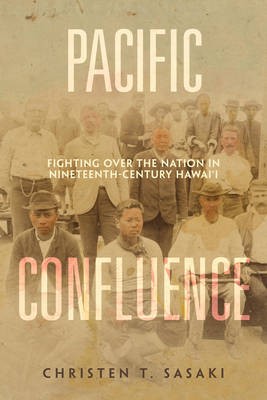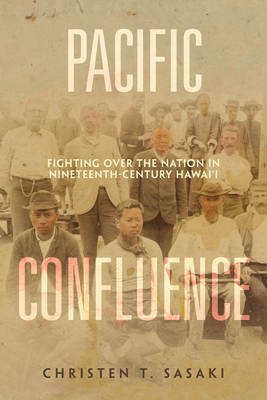
- Afhalen na 1 uur in een winkel met voorraad
- Gratis thuislevering in België vanaf € 30
- Ruim aanbod met 7 miljoen producten
- Afhalen na 1 uur in een winkel met voorraad
- Gratis thuislevering in België vanaf € 30
- Ruim aanbod met 7 miljoen producten
Zoeken
Pacific Confluence
Fighting Over the Nation in Nineteenth-Century Hawai'i Volume 69
Christen T Sasaki
€ 161,45
+ 322 punten
Uitvoering
Omschrijving
The 1898 annexation of Hawaiʻi to the US is often framed as an inevitable step in American expansion--but it was never a foregone conclusion. By pairing the intimate and epic together in critical juxtaposition, Christen T. Sasaki reveals the unstable nature not just of the coup state but of the US empire itself. The attempt to create a US-backed white settler state in Hawaiʻi sparked a turn-of-the-century debate about race-based nationalism and state-based sovereignty and jurisdiction that was contested on the global stage. Centered around a series of flash points that exposed the fragility of the imperial project, Pacific Confluence examines how the meeting and mixing of ideas that occurred between Hawaiians and Japanese, white American, and Portuguese transients and settlers led to the dynamic rethinking of the modern nation-state.
Specificaties
Betrokkenen
- Auteur(s):
- Uitgeverij:
Inhoud
- Aantal bladzijden:
- 266
- Taal:
- Engels
- Reeks:
Eigenschappen
- Productcode (EAN):
- 9780520382756
- Verschijningsdatum:
- 29/11/2022
- Uitvoering:
- Hardcover
- Formaat:
- Genaaid
- Afmetingen:
- 152 mm x 231 mm
- Gewicht:
- 476 g

Alleen bij Standaard Boekhandel
+ 322 punten op je klantenkaart van Standaard Boekhandel
Beoordelingen
We publiceren alleen reviews die voldoen aan de voorwaarden voor reviews. Bekijk onze voorwaarden voor reviews.











